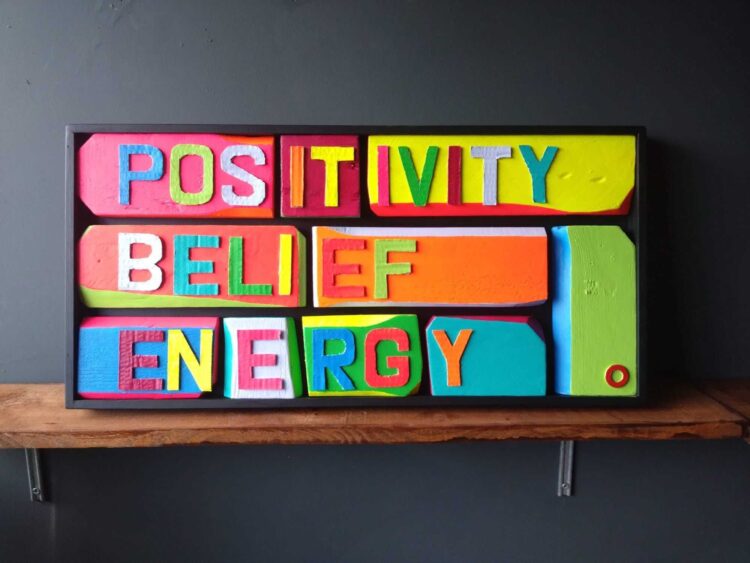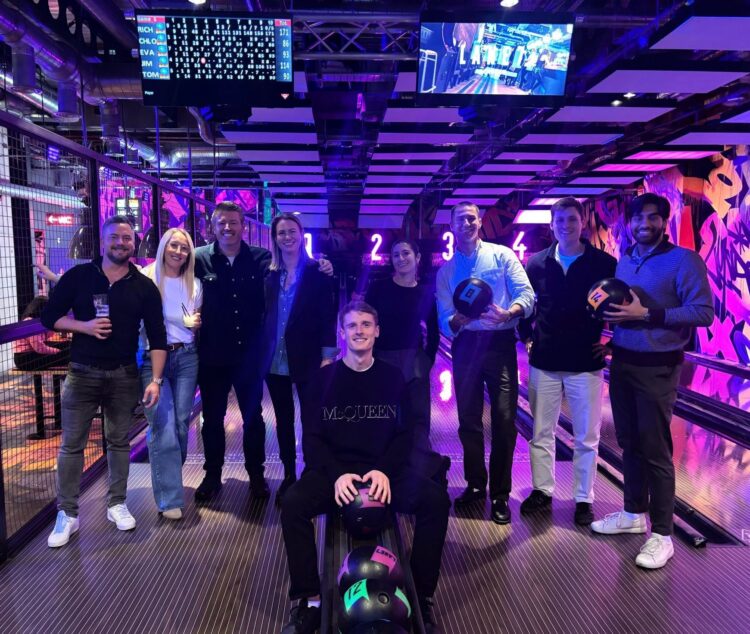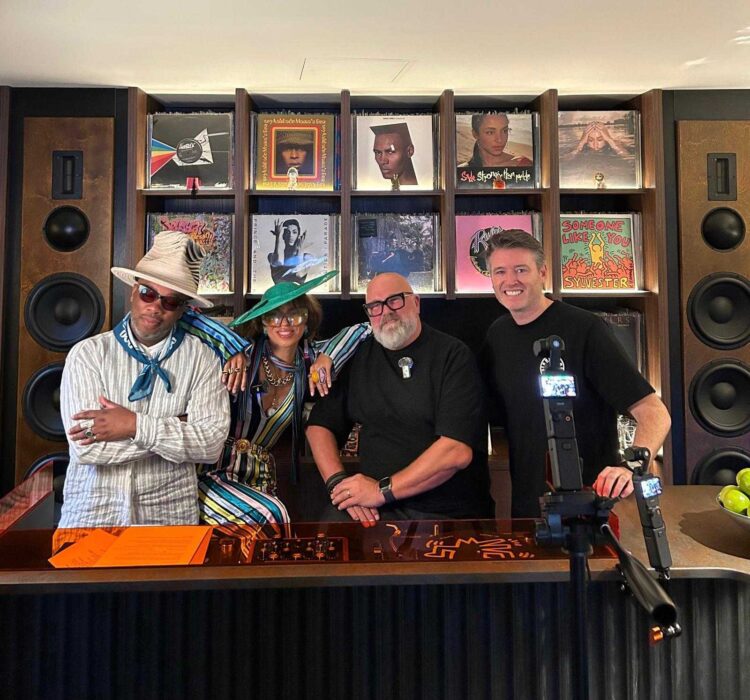From Record Decks to Digital Assets
Whether in his personal passions or professional path, Rich Clark’s journey is guided by the same set of principles: choosing positivity, believing in growth, and bringing people together.
In our latest People Without Compromise, we speak to Rich Clark, Chief Revenue Officer, about the three words that shape his life: positivity, belief, and energy. From understanding value of making mistakes for personal growth, to building communities through football leagues, music platforms, and a love of street art, Rich shares how these values guide him and why being present, curious, and connected helps him navigate all of life’s challenges.
Hi Rich, what don’t you compromise on?
Three words: positivity, belief, energy. They guide me through everything. I even commissioned a piece of street art with those words on it, which hangs just inside our front door. They shape my mindset and guide how I show up each day – being present, keeping perspective, and looking for ways to grow. I want my children to see those three words every day, to remind them, to spark conversations about what they mean and why they matter. If I can encourage them to carry the same attitude into whatever they do, then I’ll feel that I’ve given them the best start I can.

Let’s start with positivity. What is it about the word that resonates with you?
Life is busy: family, kids, work, hobbies, friends and it can be hard to juggle all at once. It’s all too easy to turn the challenges we face into negatives: you’re too busy, you want to spend more time on your hobbies, there aren’t enough hours in the day to finish your to-do’s…the list could go on. That tension is always there, but if you can lean towards the positive side, the picture looks different and you realise you live a very full life.
For me, positivity is about trying to see the best in the situations you find yourself in and in the people around you. I honestly think everyone should live their life with rose-tinted glasses on, but that doesn’t mean ignoring reality. Instead, it’s about choosing to notice the good where you can and living in the moment – not overthinking what’s next or dwelling on what’s already happened, but actually appreciating what’s right in front of you. If you can do that, life feels more balanced and ultimately more fulfilled.
Belief is also one of your three words. What does that mean to you and how do you live it?
Belief is about having the courage to try, even if you fail. I try to instil this in my kids and encourage them to try, even if they know they might make mistakes and things won’t always go the way they want them to. We call them “marvellous mistakes”, which I think is a great way of offering perspective and highlighting the fact that they’re not failing – they’re learning. The same mindset is also essential in a start-up. You have to try lots of things, some of which will fail, before you get it right and find what works. Ultimately, failing is part of everyone’s journey – it’s something we all go through at some point or another and is one of the few things that truly connects us to each other.
Belief is ultimately what drew me into crypto. Even after spending many years in a large financial institution, I was introduced to Bitcoin through a documentary in 2017. It wasn’t in the mainstream at that point and some were still dismissive of the idea, but after I drilled down further I felt – and still feel – that crypto and blockchain can offer alternative solutions to the problems the existing system is facing.
Moving into crypto was undoubtably the biggest career decision I’ve ever made – taking the leap from a large, established institution into not just a startup, but an emerging sector that was still in its infancy. At first I couldn’t even get into first round interviews: I didn’t have any “official” crypto experience, and I’d never worked in a startup before. But, despite the setbacks, I believed in myself and what I could bring, and eventually that belief led me to Zodia.
That’s why belief matters so much to me – it’s what gives you the confidence to step into something new, especially when it isn’t yet proven. That’s also what excites me about this industry: everyone involved is a disruptor, choosing a path that’s different to the one most others take, even if they don’t yet know exactly where it will lead.
You mentioned how you feel crypto represents change. What drew you in?
What struck me wasn’t just the technology but the philosophy itself. The systems we live with work for some people, but not everyone. Crypto felt like a way of re-imagining how things could work: more open, more inclusive, offering people more access to things that may not historically have been within reach.
It’s not about tearing everything down. It’s about creating alternatives that sit alongside what we already have, and about building something that might be fairer and more transparent in the future. That possibility is what excites me.
What about Energy? How is that connected?
The connecting thread that pulls all this together is energy. It’s so important to bring the right energy to your life, so you can handle any situation thrown at you. For me, that manifests in bringing people together socially, both inside and outside of work.
Community is super important and can be found in so many settings, but it really shows up in sport, music and art. I like bringing people together, whether that’s for a quick game of football, a client event at a bowling alley or connecting with likeminded people about music and art. That all comes from the energy you bring – showing up and getting people involved, which is also important in sales and even more so in crypto – it’s all about relationships.
That idea of gaining energy through community runs through a lot of what you do. Tell us about how that shows up through sport?
Sport has always been a big part of my life, and I’ve always loved the friendships and the team spirit that come with it. That’s carried across into work related activities, and the start of initiatives like Challenge Zodia. I wanted connections with clients, prospects and industry partners to be more than just dinners or drinks; I wanted us to plan events that were active, fun and perhaps a little competitive, where people could get to know each other in a more relaxed, informal setting. In this industry everyone’s under pressure – we’re all feeling the stress of scaling businesses and constantly adapting to changing market conditions – but when you’re running around a padel court or playing five-a-side football, for an hour or two you’re just there together, not checking your phone or worrying about the market.

The Crypto Football League, which I started with Louis Rosher at Zodia, was also an opportunity to bring companies from across the industry together. Regardless of your role in the ecosystem – as competitors, partners or building new relationships – it’s a chance to play together and have a little league of our own. We’ve now got 16 teams from across the industry, and while the games themselves are great fun, often the best part is after when people stay to talk and build relationships that might not happen otherwise.
You talked about how you’ve commissioned pieces of street art for your home. What about that draws you in?
I got into street art probably around 15-20 years ago, when I noticed Banksy’s art first appear on buildings around the city, and went down a rabbit hole exploring other styles and artists. Now, whenever I visit a new city, I try to find a street art tour. It’s such a cool way to explore a new place, and I love the accessibility of it – not everyone feels comfortable in galleries or museums, but street art is there for all.
It’s also always changing, which makes it so special. A wall in Shoreditch, for example, might look completely different from one week to the next. It’s art that evolves with its community and gives people something different to look at – sometimes intriguing, sometimes thought-provoking, sometimes shocking, but always new.
At home my walls are completely covered with pieces from different artists, and it’s reached the point where I need to have a one-in, one-out policy. Like it is for many collectors, each piece holds meaning. I can look and remember where I was or who I was with when I bought it, and even after 10 years of owning a piece, it still brings me joy.
Has music also been a defining part of your life?
Music has always been a big part of my life, but electronic music in particular holds a special place. Many years ago, one of my best friends and I wanted to dedicate some of our time outside of work to create a platform to showcase the tracks we loved with others, create a community and hopefully introduce more people to electronic music, so we set up an Instagram account called House Culture.
What began as the two of us simply sharing the music we cared about quickly grew, and today the account has over 500,000 followers. As the account grew, we got to know one of our most active followers – who has since become a close friend – who suggested that we should start a podcast together that he would host and produce. In the podcast he would speak to DJs and artists about their journey into the industry, what inspires them, their catalogue of work and much more. We went all in on the idea and let him run with it, and it has since taken off – we’re about 80 episodes in now and have been fortunate enough to feature guests including Fatboy Slim, Paul Oakenfold and Todd Terry! It’s always great to hear about what inspired people to get into music, but the conversation often takes unexpected turns and drifts into their lives beyond the music, so you end up hearing some really interesting personal stories.

House Culture has always been about creating a space to connect with others and share music, but during COVID I also reconnected with music on a more personal level. I reclaimed my old decks from my parents’ house (where they had been sat gathering dust since I left for university!) and rediscovered my love for it. I realised I’d missed out on about 15 years of records so dove in headfirst to try and catch up, spending many late nights speaking to other collectors and searching through Discogs (a music dataplace and marketplace) for new records or hidden gems to add to my collection.
I ended up buying boxes and boxes of records – at one point the post man brought them in on a hand truck, which I think alarmed my family and neighbours! My collection is in the thousands now, spanning many genres but particularly electronic music, and I have this dream of one day building a soundproof outhouse where I can play music as loud as I like. That’s the ultimate goal, but I also try to remember it’s the journey that matters: finding music, meeting people, creating community and hearing the stories that are attached to each record.
Looking across all the facets of your life – family, art, music, sport, crypto – what connects them?
It all comes back to people. Bringing them together, creating energy, building communities. That’s what makes me happiest.
Share article:
Stay up-to-date
Sign up for the latest news, research and events from Zodia.

Get in touch
Our friendly team is always here to chat







